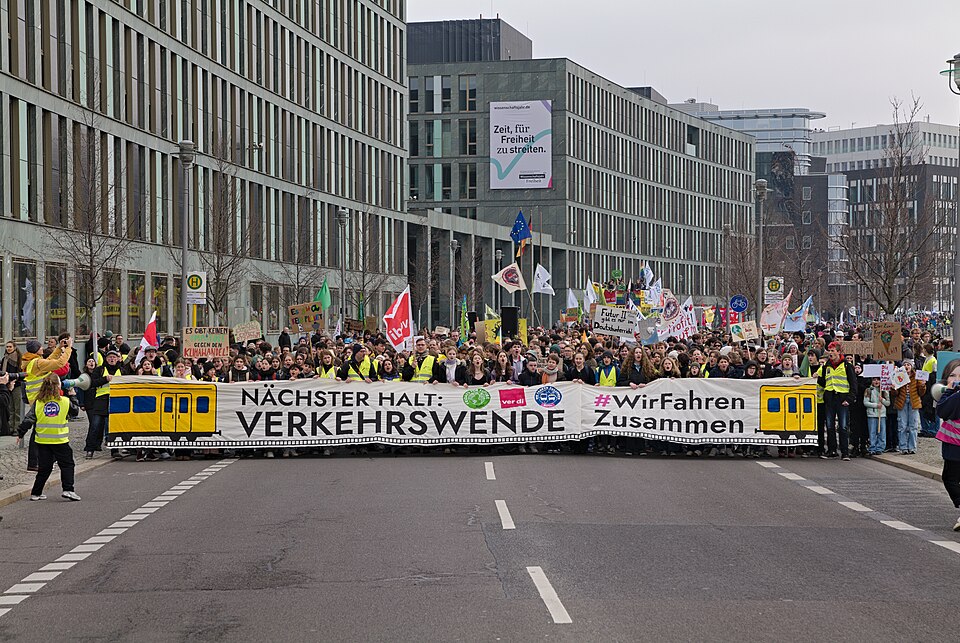
Climate beyond Classism
Below this German text you find an English version of the project description.
Bild veröffentlicht unter Creative-Common-Lizenz: Gemeinsame Demonstration von ver.di und Fridays for future.
Klimagerechtigkeit braucht soziale Gerechtigkeit – auch in der Bildungsarbeit. Während soziale Ungleichheit in unserer Gesellschaft wächst und durch die Klima- und Umweltkrise weiter verschärft wird, fehlt es noch immer an Räumen, in denen sich Menschen über die Zusammenhänge von Klima und Klasse austauschen können.Bildungsangebote zu diesem Thema sind rar, und auch innerhalb der Klimabewegung wird Klassismus bislang kaum thematisiert. Dabei sind gerade Menschen mit geringerem Einkommen, ohne akademische Bildung oder mit prekärem Aufenthaltsstatus besonders stark von der Klima- und Umweltkrise betroffen – ihre Perspektiven sind jedoch weiterhin unterrepräsentiert.
Mit dem Projekt Climate of Solidarity haben wir gemeinsam mit dem Kollektiv radix in den Jahren 2023 und 2024 zwei Jahre lang intensiv zu Klassismus und Klimagerechtigkeit gearbeitet. Wir haben Methoden und Arbeitsmaterialien entwickelt und im Handbuch Klasse.Macht.Klima veröffentlicht sowie Workshops und Seminare zum Thema durchgeführt.
Mit Climate beyond Classism führen wir diese Arbeit 2024 und 2025 weiter – und entwickeln sie zugleich weiter: Im Mittelpunkt steht erneut die Verbindung von Klassismuskritik und Klimagerechtigkeit. Unser Ziel ist es, das Thema über den deutschsprachigen Raum hinaus auf eine europäische Ebene zu bringen und international sichtbarer zu machen. Dafür arbeiten wir mit diesen Partnerorganisationen aus Europa zusammen: European Anti-Poverty Network Lettland und Niederlande, Kollektiv radix aus Wien, Service Civil International – Österreich, Change Multipliers aus Griechenland, Degrowth in Action aus Barcelona, sowie der polnische Ökologische Verein aus Danzig (Polski Klub Ekologiczny Okręg Pomorski).
Im Rahmen des Projekts führen wir zwei internationale Seminare durch und erstellen ein englischsprachige Methodensammlung zum Thema:
Eine Multiplikator*innen-Schulung, in der sich Menschen mit unseren Methoden aus dem Handbuch Klasse.Macht.Klima fortbilden können – und gleichzeitig erfahren, wie sie selbst zu dem Thema aktiv werden können, insbesondere in der politischen Bildungsarbeit.
Ein Empowerment-Retreat für Menschen mit eigenen Klassismuserfahrungen und Bezug zu Klima- und Umweltthemen. Hier steht der Austausch, das gemeinsame Lernen und gegenseitige Empowerment im Mittelpunkt – ebenso wie das Entwickeln neuer Ideen für zukünftige Projekte.
Zum Abschluss des Projekts veröffentlichen wir ein englischsprachiges Handbuch für Bildungsarbeiter*innen, dass eine Einführung ins Thema bietet, Hinweise für diskriminierungskritische Bildungsarbeit enthält und zahlreiche Methoden sowie Arbeitsmaterialien rund um die Verbindung von Klima und Klassismus bereitstellt.
Weitere globale Perspektiven auf das Thema entstehen in unserem Projekt Klasse.Klima.Weltweit.
Interesse an einem Workshop zu Klima und Klassismus? Wir werden auch weiterhin einzelne Workshops zu dem Thema anbieten. Fragt uns gerne an, wenn ihr Interesse habt, uns in eure Gruppe einzuladen oder eine öffentliche Veranstaltung mit uns durchzuführen.

The European Commission support for the production of this publication does not constitute an endorsement of the contents which reflects the views only of the authors, and the Commission cannot be held responsible for any use which may be made of the information contained therein.
Climate justice requires social justice – also in education.
As social inequality continues to grow and is further exacerbated by the climate and environmental crisis, there is still a lack of spaces where people can engage in exchange about the connections between climate and class. Educational opportunities on this topic are scarce, and even within the climate movement, classism is rarely addressed. Yet it is precisely people with lower incomes, without academic education, or with precarious residency status who are most affected by the climate and environmental crisis – but their voices are rarely heard.
With the project Climate of Solidarity, we worked intensively on classism and climate justice in 2023 and 2024 together with the collective radix. We developed methods and educational materials, published them in the handbook Klasse.Macht.Klima, and carried out workshops and seminars on the topic.
With Climate beyond Classism, we are continuing and further developing this work in 2024 and 2025. Once again, the focus is on the intersection of classism and climate justice. Our goal is to bring this topic beyond the German-speaking context and make it more visible on a European level. To do this, we are working with the following partner organizations from across Europe: the European Anti-Poverty Network Latvia and the Netherlands, Kollektiv radix from Vienna, Service Civil International – Austria, Change Multipliers from Greece, Degrowth in Action from Barcelona, and the Polish Ecological Club from Gdańsk (Polski Klub Ekologiczny Okręg Pomorski).
As part of the project, we are holding two international seminars and creating an English-language collection of methods on the topic:
A multipliers training, where participants can deepen their knowledge using the methods from the Klasse.Macht.Klima handbook – and learn how to become active on this topic themselves, especially through educational work.
An empowerment retreat for people with lived experiences of classism and a connection to climate and environmental topics. The focus here is on exchange, collective learning, mutual empowerment, and the development of new ideas for future projects.
At the end of the project, we will publish an English-language handbook for educators, offering an introduction to the topic, guidance for discrimination-critical education, and a wide range of methods and materials exploring the intersection of climate and class.
Further global perspectives on the topic are emerging in our project Klasse.Klima.Weltweit.